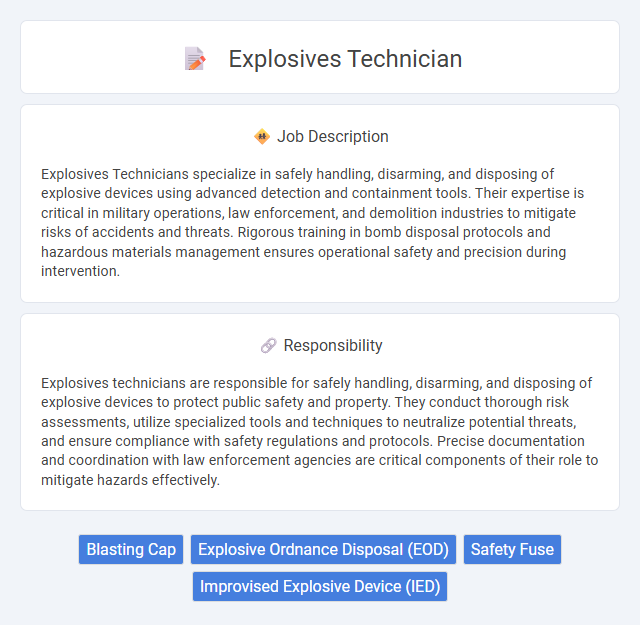
Explosives Technicians specialize in safely handling, disarming, and disposing of explosive devices using advanced detection and containment tools. Their expertise is critical in military operations, law enforcement, and demolition industries to mitigate risks of accidents and threats. Rigorous training in bomb disposal protocols and hazardous materials management ensures operational safety and precision during intervention.
Individuals with strong problem-solving skills and the ability to remain calm under pressure are likely suitable for an Explosives Technician role. Those who have a high tolerance for risk and physical fitness may have a better chance of thriving in this high-stress, detail-oriented environment. People who are prone to anxiety or have difficulty focusing in critical situations might find this occupation unsuitable.
Qualification
Explosives Technicians must possess specialized training in handling, disarming, and disposing of explosive materials, often requiring certification from recognized agencies such as the FBI or military bomb disposal units. Candidates typically hold a background in engineering, chemistry, or law enforcement, accompanied by physical fitness and the ability to work under high-pressure situations. Advanced knowledge of explosives technology, safety protocols, and risk assessment is essential for successful qualification in this high-stakes profession.
Responsibility
Explosives technicians are responsible for safely handling, disarming, and disposing of explosive devices to protect public safety and property. They conduct thorough risk assessments, utilize specialized tools and techniques to neutralize potential threats, and ensure compliance with safety regulations and protocols. Precise documentation and coordination with law enforcement agencies are critical components of their role to mitigate hazards effectively.
Benefit
Explosives technicians likely experience substantial benefits such as competitive salaries, extensive training, and opportunities for career advancement. Their specialized skills may lead to high demand in sectors like law enforcement, military, and construction, increasing job stability. Potential health and safety benefits, including access to protective gear and medical monitoring, might also be significant.
Challenge
The role of an explosives technician likely involves high-intensity challenges requiring precision and calm under pressure. Handling dangerous materials and defusing potential threats may demand continuous problem-solving and adaptability. This position probably tests both technical expertise and emotional resilience regularly.
Career Advancement
Explosives Technicians specialize in handling and neutralizing explosive devices, with career advancement opportunities leading to senior technical roles, supervisory positions, and specialized fields like bomb disposal or forensic analysis. Gaining certifications such as the Certified Explosives Specialist (CES) and continuous training in safety protocols and new technologies enhances promotion prospects. Advancement often involves leadership in emergency response teams or transitioning into consulting roles for government and private sector security agencies.
Key Terms
Blasting Cap
Blasting cap technicians specialize in handling and deploying detonators crucial for controlled explosions in mining, construction, and demolition projects. Expertise in safety protocols and precise timing ensures effective initiation of explosive charges while minimizing risk. Mastery of electronic and non-electric blasting caps is essential for optimizing blast outcomes and enhancing operational efficiency.
Explosive Ordnance Disposal (EOD)
Explosives Technicians specializing in Explosive Ordnance Disposal (EOD) are skilled professionals trained to detect, disarm, and safely dispose of hazardous explosive devices, including improvised explosive devices (IEDs), landmines, and unexploded military munitions. These experts utilize advanced bomb disposal robots, X-ray systems, and protective gear to mitigate risks during EOD operations in military, law enforcement, and counter-terrorism contexts. Proficiency in threat assessment, demolition techniques, and compliance with safety protocols is essential for ensuring public safety and preventing catastrophic damage.
Safety Fuse
Explosives technicians specialize in handling and detonating explosive materials with precision, prioritizing safety protocols to prevent accidents. The safety fuse is a crucial component in their work, providing a controlled delay between ignition and explosion, allowing the technician to clear the area safely. Mastery of safety fuse technology enhances operational efficiency and minimizes risk during demolition, mining, and construction projects.
Improvised Explosive Device (IED)
Explosives Technicians specialized in Improvised Explosive Devices (IEDs) are trained to detect, disarm, and safely dispose of homemade bombs that pose significant threats in military and civilian environments. Their expertise involves advanced knowledge of explosive materials, triggering mechanisms, and counter-IED technologies to mitigate risks during operations. Mastery in remote handling tools, bomb suits, and electronic jamming devices ensures the effective neutralization of IEDs, safeguarding lives and infrastructure.
 kuljobs.com
kuljobs.com